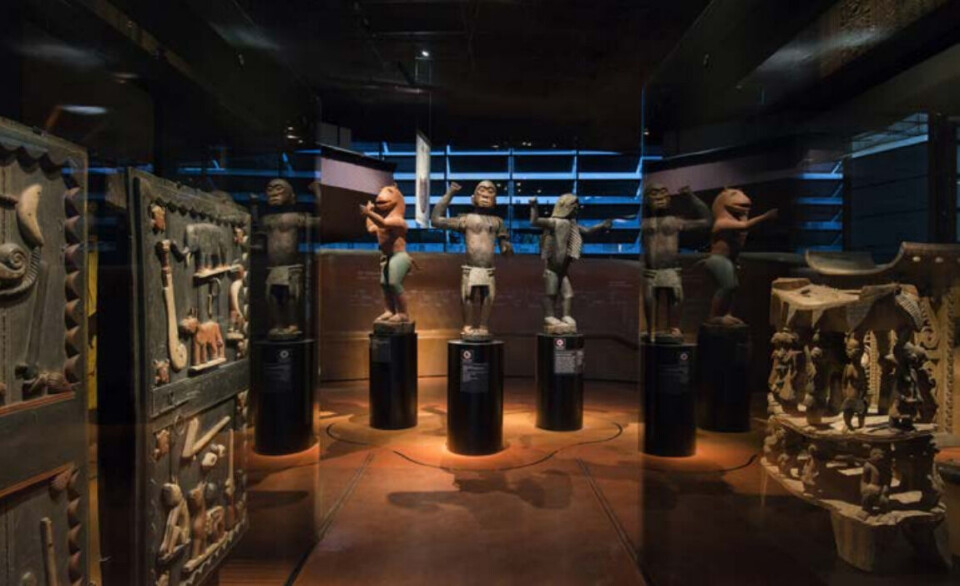-
Farmer protests block motorway entrances and major roads in south-west France
Ongoing action comes in response to culling of cattle affected by contagious Lumpy Skin Disease
-
Many parcel collection points in France are overwhelmed as Christmas approaches
Heavy customer traffic leaves some struggling to cope
-
Warnings issued over connecting to public WiFi networks in France
Lack of encryption and risk of connecting to ‘fake networks’ leave users at risk of hacking attempts
France returns 26 looted treasures to Benin in historic handover
President Emmanuel Macron met his Beninese counterpart in Paris to give back the artefacts, 130 years after they were first stolen from the former French colony

African artefacts that were stolen from the African country of Benin in the 19th century are to be returned home from the Musée du Quai Branly in Paris today (November 10).
A total of 26 pieces have been returned home by plane in what the Benin authorities have called “a historic moment for national pride”.
Three years after the commitment of President @EmmanuelMacron, the 26 regalia items from Abomey are returned to Benin.
— France Diplomacy 🇫🇷🇪🇺 (@francediplo_EN) November 9, 2021
An important step regarding the relations between France and the African continent. https://t.co/G3aL7IM0PD
President Emmanuel Macron met his Beninese counterpart Patrice Talon as part of the handover.
The countries’ culture ministers, Roselyne Bachelot and Jean-Michel Abimbola respectively, signed a transfer of property document officially giving back the treasures 130 years after they were first stolen from the former French colony in 1892.
President Macron said: “This is a historic, symbolic and moving moment, which was so anticipated but so unexpected. I hope that this movement will carry on...and we will continue this work together.”
The pieces will fly on a plane with President Talon and be welcomed in the Beninese city of Cotonou today.
Benin's President Patrice Talon signed an agreement to take back from France 26 artworks seized from the former French colony in the 19th century, and said he hoped it would pave the way for more cultural treasures to be handed back https://t.co/HRdzJvPlNt pic.twitter.com/CG2BRonDAI
— Reuters (@Reuters) November 9, 2021
Artefact acclimatisation
Among the artefacts are totem statues from the ancient kingdom of Abomey, and the throne of King Béhanzin, which were looted when the Abomey palace was sacked by French colonial troops in 1892.
Before being transported back to Benin, the treasures were exhibited for the final time at the Quai Branly museum, where an estimated 15,000 people came to see them in seven days.
Community leader Dah Adohouannon told the AFP in Cotonou: “I am thrilled at the thought of looking closer at these royal treasures, especially the thrones of our ancestors. It is unimaginable. For all my 72 years, I can now die in peace, once I have seen them.”
The pieces will be ‘acclimatised’ for two months on arrival to ensure they adapt to the new climate and humidity, before being exhibited at the Beninese president’s palace for three months.
They will then be taken to the former Portuguese fort of Ouidah, and the governor's house—which are both historic sites of European colonisation and slavery—pending the construction of a new museum in Abomey.
More restitution needed
President Talon thanked Mr Macron but said that more treasures remained to be returned. He did not rule out returning again to oversee the transfer of more artefacts in future.
Benin has requested the restitution of 5,000 pieces in total.
He said: “The Beninese people express their gratitude. But this is only the first step...How can my enthusiasm be total, when major works such as the Dieu Gou or the Fâ divination tablet continue to be held here in France, to the great displeasure of their rightful owners?”
Mr Abimbola said: “Of course, this is only 26 works out of thousands, but we are starting something that cannot be stopped. We’ve opened the floodgates and we are no longer resigned to not getting other works back.”
He said that this would include requesting restitution of other pieces from countries including Germany, the UK, and the US.
‘New relationship between France and the African continent’
Since 2019, seven African countries (including Benin) have requested the restitution of historical effects from France to their original country: Senegal, Côte d'Ivoire, Ethiopia, Chad, Mali, and Madagascar.
Experts have estimated that as much as 85-90% of African heritage is located outside of the continent.
In 2017, during a speech given in Ouagadougou, the capital of Burkina Faso, President Macron pledged to restitute African treasures still in France to their home nations within five years.
Ms Bachelot noted: “[This initiative] is an important marker for the building of a new relationship and regard between the African continent and France.
Next, France is set to restitute the Djidji Ayokwe, a famous ‘talking drum’, to Côte d'Ivoire.
Related stories
39% of people polled shun culture events in France despite health pass
World’s largest known triceratops dinosaur up for auction in Paris
Explore the museum in France that celebrates bell arts and making
























